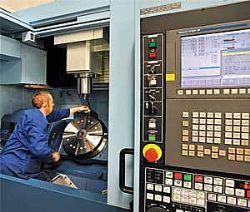IN AN unusual role reversal, Auckland plastic injection moulding manufacturing company Adept has installed a machine which could take its Chinese competitors head on. The five axis, high speed precision machining centre reduces the labour component in tooling so that Adept can produce top quality but highly complex dies for similar prices to those coming from Chinese origins. Adept is a 38 year old privately owned company based in Morningside that designs and manufactures plastic injection mouldings, and has a 90-strong team of designers, toolmakers and moulding technicians. Adept managing director Murray Fenton says the company is constantly searching for a way to remain competitive by introducing world class products in an increasingly crowded market. He thinks the new machine using a specialised Japanese CAM (Computer Aided Machining) program could be just the ticket. “We believe we can compete with the high end, high quality complex tooling that medical devices demand. This is because much of the machining work is done unattended and its accuracy in microns means there is very little manual work in fitting – the sort of additional task that China excels in because of the cheap semi-skilled labour. “We’ve done away with that and it has big benefits to New Zealand companies to have an important part of their manufacturing process done here in New Zealand. Not only does it provide security in knowing they get what they ask for, but they can get modifications done in a timely fashion. There’s effective and clear communication for design improvements and perhaps, even more critically, there’s no risk of counterfeiting their product or losing their IP.” Adept is a key supplier of high tech components to companies like Fisher & Paykel Healthcare and, as well as manufacturing custom products for clients, the company produces specialist products itself. It has a unique position, holding around 80 percent of the global meat industry market with its own designed and developed systems that reduce pathological contamination of meat in abattoirs. Fenton says the company is already making huge gains in time and accuracy with, typically, a machining process that previously took two days being completed in four hours with one set up.• reader enquiries quote: D081104
Moulding company takes on Chinese competition
General
Wednesday, 05 November 2008






